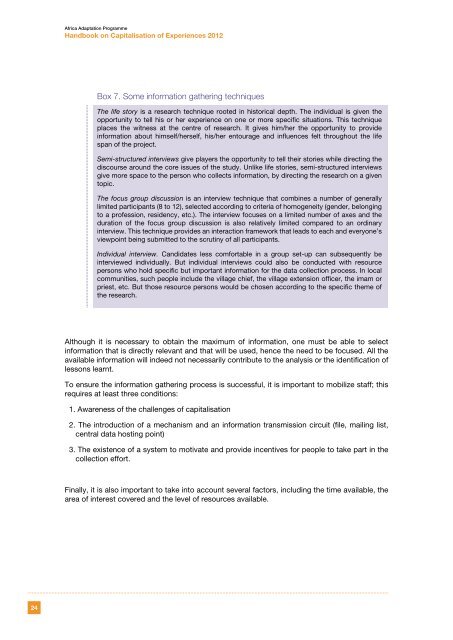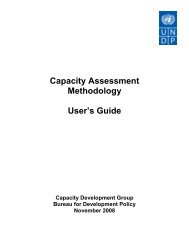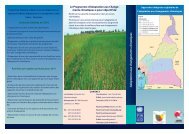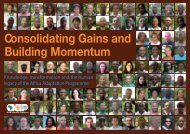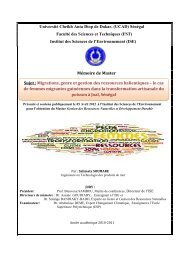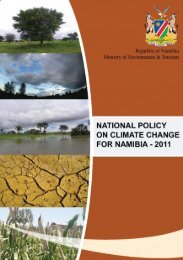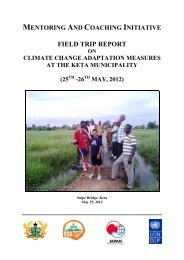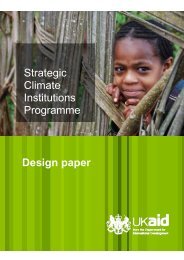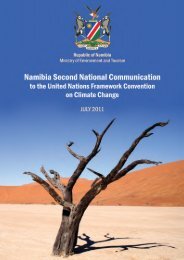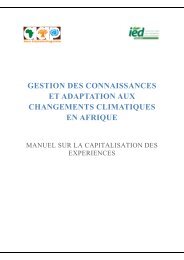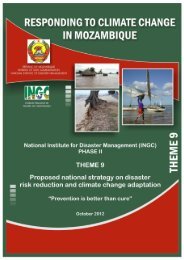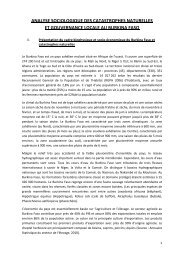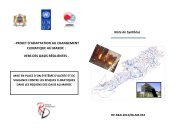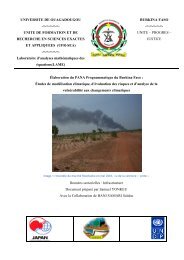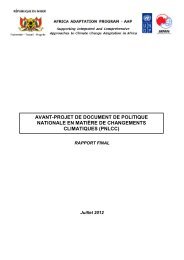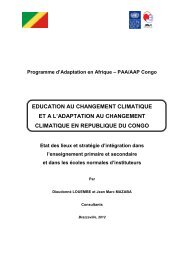Handbook of Capitalisation 2012.pdf - Africa Adaptation Programme
Handbook of Capitalisation 2012.pdf - Africa Adaptation Programme
Handbook of Capitalisation 2012.pdf - Africa Adaptation Programme
Create successful ePaper yourself
Turn your PDF publications into a flip-book with our unique Google optimized e-Paper software.
<strong>Africa</strong> <strong>Adaptation</strong> <strong>Programme</strong><br />
<strong>Handbook</strong> on <strong>Capitalisation</strong> <strong>of</strong> Experiences 2012<br />
Box 7. Some information gathering techniques<br />
The life story is a research technique rooted in historical depth. The individual is given the<br />
opportunity to tell his or her experience on one or more specific situations. This technique<br />
places the witness at the centre <strong>of</strong> research. It gives him/her the opportunity to provide<br />
information about himself/herself, his/her entourage and influences felt throughout the life<br />
span <strong>of</strong> the project.<br />
Semi-structured interviews give players the opportunity to tell their stories while directing the<br />
discourse around the core issues <strong>of</strong> the study. Unlike life stories, semi-structured interviews<br />
give more space to the person who collects information, by directing the research on a given<br />
topic.<br />
The focus group discussion is an interview technique that combines a number <strong>of</strong> generally<br />
limited participants (8 to 12), selected according to criteria <strong>of</strong> homogeneity (gender, belonging<br />
to a pr<strong>of</strong>ession, residency, etc.). The interview focuses on a limited number <strong>of</strong> axes and the<br />
duration <strong>of</strong> the focus group discussion is also relatively limited compared to an ordinary<br />
interview. This technique provides an interaction framework that leads to each and everyone’s<br />
viewpoint being submitted to the scrutiny <strong>of</strong> all participants.<br />
Individual interview. Candidates less comfortable in a group set-up can subsequently be<br />
interviewed individually. But individual interviews could also be conducted with resource<br />
persons who hold specific but important information for the data collection process. In local<br />
communities, such people include the village chief, the village extension <strong>of</strong>ficer, the imam or<br />
priest, etc. But those resource persons would be chosen according to the specific theme <strong>of</strong><br />
the research.<br />
Although it is necessary to obtain the maximum <strong>of</strong> information, one must be able to select<br />
information that is directly relevant and that will be used, hence the need to be focused. All the<br />
available information will indeed not necessarily contribute to the analysis or the identification <strong>of</strong><br />
lessons learnt.<br />
To ensure the information gathering process is successful, it is important to mobilize staff; this<br />
requires at least three conditions:<br />
1. Awareness <strong>of</strong> the challenges <strong>of</strong> capitalisation<br />
2. The introduction <strong>of</strong> a mechanism and an information transmission circuit (file, mailing list,<br />
central data hosting point)<br />
3. The existence <strong>of</strong> a system to motivate and provide incentives for people to take part in the<br />
collection effort.<br />
Finally, it is also important to take into account several factors, including the time available, the<br />
area <strong>of</strong> interest covered and the level <strong>of</strong> resources available.<br />
24


